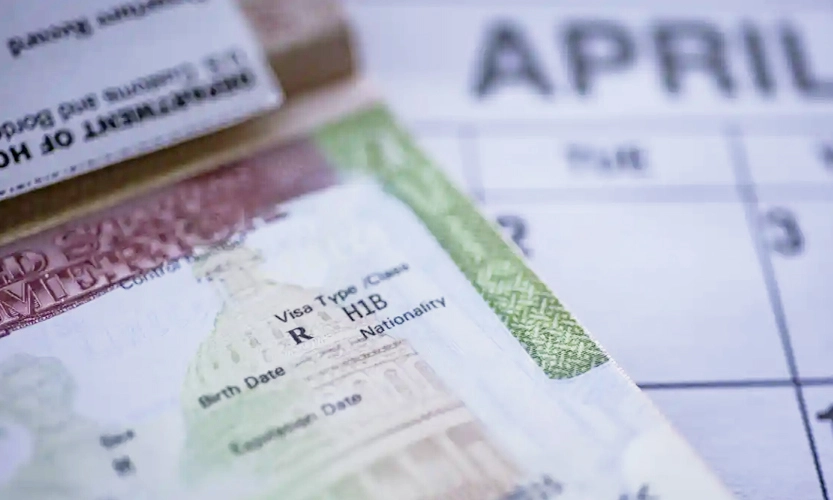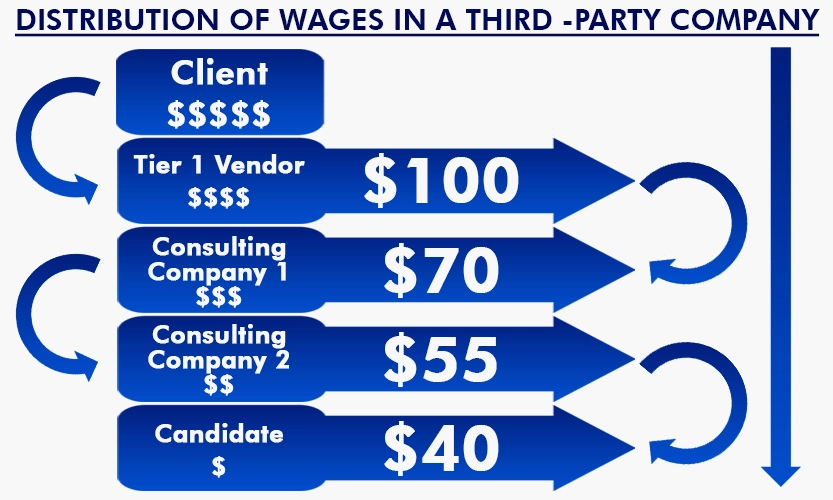Recently a new final rule was signed by DHS that redefines the employer-employee relationship. As per the new H1 B Visa rule, the clients of third-party companies where H1B works will be deputed must file (LCA) Labor Condition Application & H-1B applications. It will result in a higher administrative cost & burden for the clients.
Previously only the consulting or staffing companies (primary employers) were responsible for filing legal requirements & obligations for placing H-1B workers in their client’s organizations. However, with the implementation of the new h1b rules, the legal obligations of filing LCA have been extended to its clients (secondary employers).
This rule will severely affect America’s I.T. industry which heavily relies on Indian I.T. professionals. Not many clients would want to file H1B visa applications as that will point fingers at them for displacing American workers.
Since the employer and the client must file LCA, some H-1B workers will have multiple petitions & LCAs. Thus, any F1 OPT visa student who wants to file for H-1B must not rely on the staffing companies as this new amendment will make it difficult for their H1B visas. Due to the filing of 2 LCAs, it will be difficult for H-1B workers to approve their ISA & extension.
Now the ideal thing is to find direct employment with clients so that one employer will file your H1B visa application & LCA.
This rule will ensure that only exceptionally talented & technically qualified candidates will get employed & receive an H1B visa. It confines the entry of regular low-paid tech employees to prevent the displacement of American employees by low-paid foreign labor. If you want to get exceptional in technology, reach out to SynergisticIT and let us help you stand out from the crowd and get your foot in the door to work with great tech clients.
DHS Update– DHS and USCIS published the Final Rule to amend the H1B visa selection process. It replaces the random selection of candidates in the lottery process with a salary-based selection system. Earlier registrants of H-1B visas were selected regardless of their merits. However, with the new H1 b rule, the applicants will be shortlisted based on their proposed salaries. So, workers with relatively higher wages are likely to have good chances of getting an H1B visa than their lower-paid peers.
According to DHS, the wage-based selection process will compel H-1B employers to offer higher salaries or file petitions for positions requiring higher skills to increase the likelihood of selection under the H-1B visa cap. It will boost the number of competent professionals in the country.
While this rule will be the biggest boon for the highest-paid workers earning level 4 salaries, on the other side, immigration experts are of a different view. If the new rule is implemented, they say it will become impossible for entry-level workers to obtain an H-1B visa. Also, the workers at level 2 wages may face a chain of challenges to get selected.
The new H1b rule will make foreign hiring more difficult & will majorly impact Indian aspirants as Indians constitute the largest part of F1 OPT visa programs. DHS refutes the charges & says that any change in the H-1B selection process will not affect F1 OPT visa students. Instead, it will increase employment opportunities at higher wage levels & prompt the selection of the most qualified students for H1B visa status.
H1B visa is a temporary nonimmigrant work visa that allows U. S. companies to hire skilled foreign workers to fill specialty occupations. As per DOL, “The H1B visa program applies to the U.S. employers to hire nonimmigrants as workers in specialty occupations or as fashion models of distinguished abilities & merits. A specialty occupation refers to the application of highly specialized knowledge & the attainment of at least a bachelor’s degree or equivalent. The H-1B provisions intend to help companies who otherwise cannot find the needed skills & abilities from the U. S. workers by authorizing temporary employment of qualified individuals who otherwise are not authorized to work in the U.S. “
Around 500,000 foreign workers are working in the U.S. in H-1B status. However, many employers have misused the H-1B program to drive thousands of foreign workers at low wages compared to U.S. workers for the same occupation.
Thus, reforming the default prevailing wage methodology and F1 OPT visa employer requirements has become indispensable. DOL has laid new rules to address the faulty prevailing wage system in the H1B visa and other foreign worker programs.
On October 8 2020, the U.S. Department of Labor (DOL) issued the interim final rule to safeguard wages and jobs for American workers. The rule predominantly affects H1B visa holders, F1 OPT visa students, green card citizens, L2 EAD visa holders, and U.S. citizens.
The interim final rule will refine the accuracy of prevailing wages paid to foreign workers by aligning them with those paid to U.S. workers for similar occupations. It will protect U.S. workers from unfair competition prompted by the arrival of foreign workers with lower wages. Hence, if an employer wants to employ a foreign worker on H-1B Visa, then the employer must attest that during the period of authorized employment, he will pay the actual wage paid to other employees with the same qualification & experience or the higher of the prevailing wage. So, employers cannot use foreign workers instead of U.S. workers just because of cheap labor.
Further, the administration has proposed that the companies must pay a minimum annual wage of $150,000 to $250,000 or more to foreign-born engineers and scientists in H1-B status, which will taper the eligibility for H1-B visa approval. Since no company will prefer to pay such high salary packages to an unskilled employee, they need to be technically competent to get an H1B visa.
Major Changes in the H1B Visa Program under Interim Final Rule
1. Duration of the H-1B Visa Program
The duration of the H-1B visa has decreased to 1 year from 3 years, which is applicable for foreign workers working for a third-party company on contract only.
2. Rise in Wage Requirement
When you file for an H1B visa, there are certain wage levels set by the Department of Homeland Security & Department of Labor, as per which you need to make a particular amount of money under a certain level and for a specific occupation. The minimum wage or salary for H-1B workers is defined by the ‘wage levels’ concept that differs on factors such as experience, education, and location.
- The reason for setting minimum wages for H-1B workers is to ensure that foreign workers in H-1B are getting salaries on par with U.S. citizens and that U.S. employers are not exploiting them as cheap labor.
- DOL has introduced the four-tier wage levels system under the H1B Visa Reform Act of 2004. It is commonly known as the prevailing wage level. Have a look at the definitions of 4 H-1B wage levels:
- H-1B Wage Level 1 (Entry)- The first wage level is for entry-level H-1B workers with basic knowledge and understanding of the job.
- H-1B Wage Level 2 (Qualified)- The second wage level is for qualified H1-B workers with education & the ability to perform moderate tasks with limited judgment.
- H-1B Wage Level 3 (Experienced)- The third wage level is for those H1-B workers who have years of experience in their field of study. Workers under this level are required to manage people and exercise judgment.
- H-1B Wage Level 4 (Fully Competent)-The fourth and last wage level indicates experts and professional H-1B workers who can perform complex jobs, manage different things & exercise judgment in their work.
The interim final rule has made some significant changes in the four-tier wage levels distribution, as shown below:
| OES wage level for Software Engineers | Prevailing Percentile of Wage Distribution | Prevailing Annual Salary | New Percentile of the wage distribution | Annual Salary as per New Percentile |
| Wage Level 1 (Entry) | 17th | $74,532 | 45th | $94,833 |
| Wage Level 2 (Qualified) | 34th | $93,640 | 62nd | $129,604 |
| Wage Level 3 (Experienced) | 50th | $112,569 | 78th | $151,444 |
| Wage Level 4 (Fully Competent) | 67th | $131,569 | 95th | $173,264 |
Under the Interim Final Rule, a company’s lowest possible wage to an H-1B worker has increased from the 17th percentile of a profession’s income distribution to the 45th percentile. Moreover, the uppermost wage limit has increased from the 67th percentile to the 95th percentile.
For instance, if an entry-level Software Developer in California gets an average salary of $75,000 per annum, with the new H1b visa rule, the salary will be significantly higher, like $120,000 or more.

The prevailing wage distribution allowed companies to hire foreign workers on H1-B visa as a low-cost alternative to U.S. workers. However, with the increase in wage distribution, the companies will now have to pay higher salaries to H1-B workers, so they cannot use foreign labor as a cheap alternative to U.S. workers. This hike in salaries will drastically impact thousands of small and medium-scale businesses.
3. Definition of Specialty Occupation
For an H1-B visa, you need highly specialized skills and education. Now, if you are working on an H-1B visa, your employer must prove to the government how your education or degree relates to your job. So, you may face more rejection if your job is unrelated unrelated unrelated to your bachelor’s or master’s degree.
4. Employer and Employee Relationship
The authority will supervise your relationship with your employer during, after, or before your H1B visa gets approved. It is proposed to check that the company sponsoring your H1-B visa is a real company and you have a real relationship with your employer. Under the new rule, several things that were overlooked earlier will now be analyzed closely such as:
- Does your employer supervise you daily? Do you have a weekly or daily meeting?
- Can your employer do the daily assignment, how they control you, what product you work on, and how you are attached to the company?
- If the company provides a laptop, or do you use your own?
- Does your employer provide insurance or health benefits?
- If you are working remotely, how are you are you connected with your employer?
The changes are made in the F1 OPT visa employer requirements to curb the number of fraudulent activities. Recently, federal law enforcement agencies arrested 15 foreign students for falsely staying in the United States. The culprits claimed to be employed by the companies that do not exist. According to ICE officials, the arrests were made under Operational OPTical Illusion, which is a law enforcement targeting international students who fraudulently used their F1 OPT visa program to stay in the States. Thus, to mitigate such fraudulent activities and protect national security, ICE officials ensure that all visitors, students, & schools comply with U.S. immigration laws.
Premium Processing Fees to be increased for H1B Visas
With the tightening of the H-1B visa selection process, you must be thinking of upgrading your application to premium processing, but that may cost you heavily. Lately, USCIS has announced that from October 19,, it will increase the premium processing fees for H-1B visa. There will be a hike in H-1B and L-1 visas fees from $1,440 to $2,500.
The sudden surge in the visa application fee is expected to impact I.T. firms with thousands of foreign employees on H-1B and L-1 visas. Such companies now have to pay an additional $4,000 to $4,500 for each visa extension.

Impact of the new interim rule on F1 OPT Visa Students
Many firms and small-scale organizations currently using the H-1B system might not be able to participate in the new H1B program that imposes inflation of wages. It will adversely affect foreign workers with little field experience as they often work in small companies that cannot provide them level-3 to level-4 wages. Also, large companies will avoid hiring them due to their lack of knowledge, skills, & experience. Mostly, the H-1B visa holders are recent graduates with limited or no work experience. Thus, the students on H-1B status need to develop in-demand skills and prove their specialized knowledge to the companies to secure good positions.
Survival of the Fittest
It is the need of the hour for foreign workers to get upskilled if they want to stay in the United States. Once you become qualified, companies will employ you even at higher wages, and your visa will be filed easily.

Since Interim Final Rule has introduced changes in the validity period granted to the H-1B petitioners who place foreign workers at third-party companies, H-1B workers should work for the clients directly instead of relying on a third party or a consultancy company to get a 3 years visa. Under the new rule, the employers can no longer request for 3 years validity period for H-1B petitions in which the foreign workers will be placed at a third-party worksite. Instead, the rule imposes 1-year maximum validity for any off-site H-1B petition.
Besides, working directly for the client can benefit you more in terms of financial stability. For example, if you get H-1B visa sponsorship from a staffing or consulting company, you will be placed in one of their client’s companies on contract. The client company will provide the wages for your services to the staffing or consulting company that has placed you. Thereon, your consulting company will give you the wages after deducting their share.
- Most consulting companies work in the multiple-layer model:
- So, there is a Client, then a Tier 1 vendor, then the Consulting Company-1, Consulting Company-2, and then the Candidate.
- Let’s say if the client company pays the tier 1 vendor 100$; then the tier 1 vendor will take out its share around $30 and give $70 to the first consulting company after that, the first consulting company might keep 15 & give $55 to the second consulting company and at the end, the candidate will only get $40.
The above example is illustrated below:

- This would not be enough for a consultant to file an H1B visa as the Candidate would not be able to make enough money to satisfy LCA wages.
- On the other hand, if you work for the client directly, you will get a fair share of your salary without any unnecessary deductions, and the client will be able to easily pay LCA wages & file your H1B.
As per most attorneys, most RFE’s and denials of H-1B take place when lower levels of LCA have been used for filing H-1B. So, your best bet for getting H-1B approved for 3 years is to work for a direct client rather than a staffing company.
In case you are working through a consulting company, ensure that your H-1B sponsor employer has filed the mandatory document of LCA with the U.S. Department of Labor before they file the H-1B petition with USCIS. Filing of LCA means your employer will abide by the labor rules wherein he has to pay prevailing wages, provide the same working conditions as the U.S. workers, share a copy of LCA notice with you, etc.
Conclusion
The proposed rule will certainly be a turning point for all foreign workers, U.S. employers, and the natives of America. The initiative to mandate U.S. employers to pay higher wages to H-1B professionals is an attempt to restrict the entry of foreign labor into the U.S. market and to ensure that only highly qualified professionals can use the H1b visa.
Any technology job seeker trying to get an H1b Visa in the near future needs to understand that he needs to have experience and technical skills superior toto most other candidates in the job market looking for similar jobs. To differentiate themselves from other jobseekers’ candidates should upgrade their tech skills by either self-study or by taking admission with skill enhancement training programs to gain additional skills in the latest technologies. If a candidate has a skillset vastly superior to other job seekers, then organizations would want to hire such a candidate and offer high wages and file H1b visa for a Highly skilled candidate.
Anytime you want to upgrade your skills and need a helping hand to enter or reenter the tech workforce with high-demand tech skills, reach out to us. Since 2010 we have helped 1000’s of jobseekers succeed in the technology sector. SynergisticIT’s career-oriented training programs guarantee fast-paced, quality tech education, preparing you with top-notch skills for coveted tech roles in the industry. Reach out to us. SynergisticIT– Home of the Best Data Scientists and Software Programmers in the Bay Area!
Update- The District Court of California has struck down the attempt of DOL & USCIS to change the H1B visa program, but still we’re not sure if USCIS may counter-sue. In October, DOL & USCIS published some legally questionable interim rules that could radically impact the H-1B visa program, making it more difficult for U.S. employers to sponsor foreign workers. The new interim rules changed the methods of calculating the prevailing wages for H-1B workers. Soon after publication, the rule came into effect on October 8. However, due to the recent District Court decision, the DOL may require to revert the prevailing wages in the original form to what they were before the publication of new rules in the near future.

